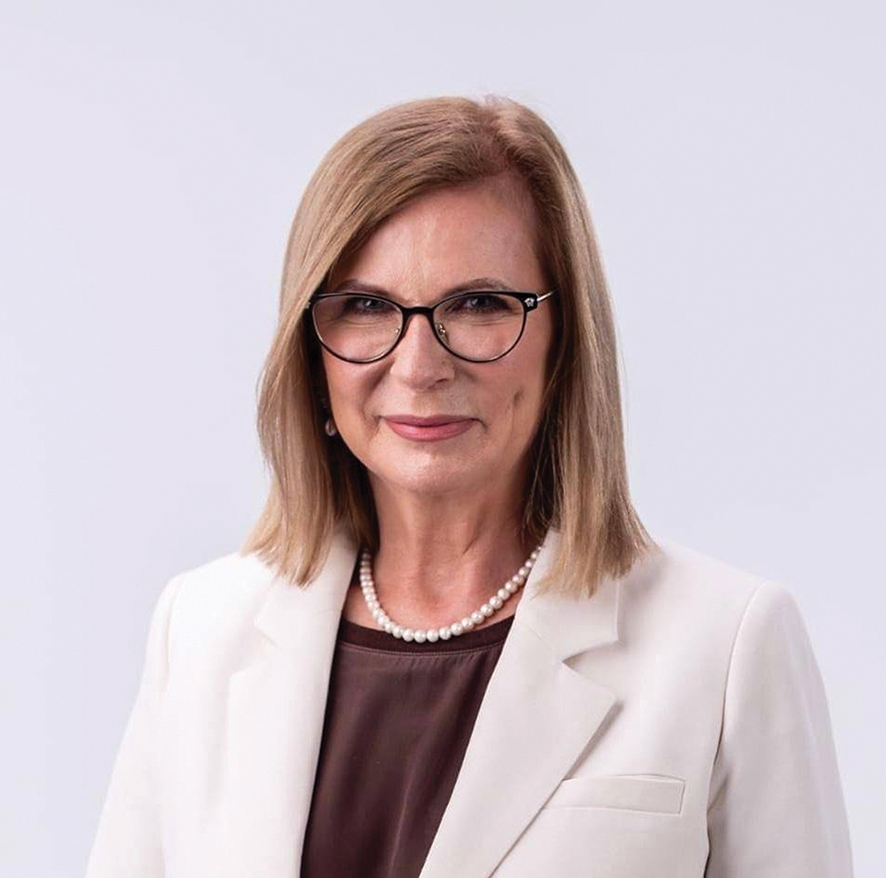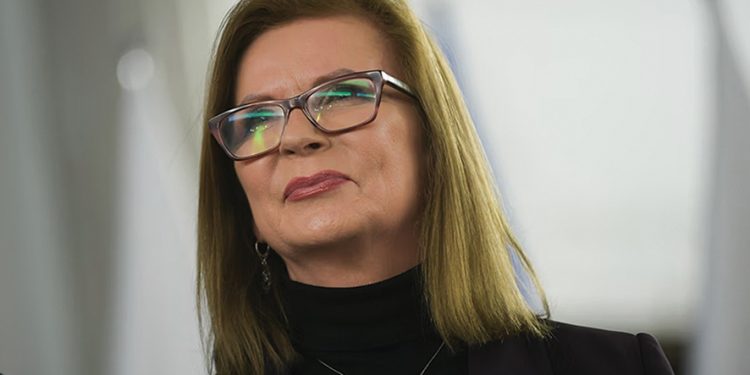The EU High Representative, Josep Borrell, announced the deployment of a “technical mission” to Georgia, aimed at “analyzing the situation on the ground,” and investigating reports of electoral fraud and irregularities. The goal is to assess what happened and take appropriate further measures to prevent future violations that disqualify Georgia from EU accession, – Deputy Speaker of the Polish Sejm, MEP Malgorzata Gosiewska, tells Radio Free Europe’s Georgian Service, in an interview given prior to the resolution on Georgia being passed. “The European Union wants to keep the door open for Georgia, but it is the government that is closing it by breaking the law, violating fundamental principles, and falsifying elections.
“This is why I strongly advocate for the non-recognition of the election results, a stance also supported by President Salome Zurabishvili. These elections have raised significant concern in Europe, which is why we cannot remain indifferent,” she says.
It seems that the EU and Georgia are at an impasse. What steps should we take now?
It must be said outright that it is Georgia that finds itself in a difficult situation. The EU should not have recognized the results of the last elections. It cannot accept Georgia’s anti-democratic and anti-citizen policies or the actions it undertakes. There can be no acceptance of election rigging, unlawful arrests, persecution of the opposition, the detention of political prisoners, aiding Russia in circumventing Western sanctions (e.g., through smuggling), or anti-Western and anti-Ukrainian rhetoric. Above all, we cannot turn a blind eye to the adoption of legislation that is incompatible with EU standards and significantly restricts Georgian society. I am referring, for instance, to the Georgian parliament’s adoption of the so-called foreign agents law modelled on Russian legislation.
Until the current Georgian authorities revise their foreign and domestic policies and begin to uphold the law, they may face isolation from the democratic Western world. It is necessary to meet the nine points outlined by the EU, repeal the adopted law, and refrain from other actions that undermine fundamental rights and the rule of law to return to the path of accession. Reports have clearly emphasised that the elections failed to meet standards and that there is a marked democratic crisis.
Until the Georgian authorities revise their foreign and domestic policies, they may face isolation from the democratic Western world
Every government, and I repeat—every government, even the best, when operating without any checks or oversight and removing all opportunities for criticism or evaluation of its actions, becomes distorted and naturally moves toward dictatorship. This is even more true when power has been in the hands of someone from the outset who lacks any scruples and who views the state through the lens of their own mafia-like interests.
Is there any room for an agreement between Brussels and Ivanishvili? For example, regarding the two controversial laws?
I am convinced that as long as Georgia refuses to return to the “democratic path,” no agreement will be possible.
The current government, “installed” by Moscow, will never act in the interest of Georgia or its society. They must be seen as the “long arm of Moscow,” which is hostile to Georgian society and poses a danger to Europe as well.
From the beginning, Georgian Dream has pursued only Russia’s interests, which align with its own. Therefore, it is difficult to talk about any agreement with them. Ivanishvili should not be considered a partner for dialogue with the democratic world. This individual should long ago have been subjected to complete isolation, both politically and economically.
You have called on the European Parliament to completely isolate Georgia’s current government. What do you think the potential consequences of such an approach could be?
I will do everything in my power to ensure that my appeal is implemented by the European Parliament. If dialogue does not yield results, other instruments must be used. It cannot be the case that the rulers of Georgia implement Moscow’s policies on one hand, while simultaneously drawing European funds and deceiving the largely pro-European Georgian society with claims of pursuing a European direction.
I support suspending the funding of programs and halting diplomatic visits
I support suspending the funding of programs and halting diplomatic visits. However, I believe that support for civic organizations, those advocating for independence, and independent media, should be maintained or even increased. Long-term sanctions should target Georgian officials and politicians. Military aid and EU funding should also be suspended.
Given the outright violation of electoral laws, election rigging, and suppression of peaceful protests, I believe the visa-free regime should be suspended, and the accession process to the EU should be halted. Only decisive steps and actions by the EU can stop the “thuggish” tendencies of this government.

Some argue that this could push Georgian Dream even closer to Russia, as they would have no other options.
Could they get any closer? Georgia’s current authorities are already entirely under Russia’s influence, so what more could happen? On the other hand, strong isolation from the EU, economic sanctions, and restricting movement for those connected to and aligned with Georgian Dream would have the desired effect. They should deeply feel the consequences of their policies. They feel untouchable because there are no repercussions from the international community. So it’s important that there is a clear and decisive stance from the Western world—total non-cooperation with those who fail to comply. Ivanishvili and Georgian Dream are fully aware of the Georgian people’s pro-European sympathies. They also know exactly what an official departure from this path would lead to. I believe they also remember how this ended in Ukraine in 2013.
Many argue that suspending the visa-free regime would punish the Georgian people rather than the government.
The suspension of visa-free travel will unfortunately result in certain difficulties for ordinary Georgians, but it is primarily intended to target those in power who undermine the principles of a democratic state.
This is, unfortunately, a painful consequence of their actions. We do not want to punish society; however, there is no other option if we wish to compel Georgia’s current government to reverse its chosen policies. An effective remedy is often bitter and unpleasant, but it restores health. Similarly, in this case, a severe sanction is intended to bring about changes that will benefit all Georgians.
The “war or peace” narrative was a key strategy for Georgian Dream during the election. What would you say to those the government is trying to convince that Russia might invade without them in power?
This is undoubtedly a propaganda tactic designed to intimidate the Georgian population. The fact is, this invasion has already been ongoing for quite some time. The official government is closely tied to Russia, with economic, political, and social affairs happening with the knowledge and consent of the Kremlin. Moreover, Russian troops already occupy territories that belong to Georgia. So what kind of invasion is Georgian Dream trying to scare people with?
If Vladimir Putin desires, he can initiate a full-scale war at any moment, regardless of who is in power. That is why the European and pro-Atlantic direction is so crucial—it is important for society to understand this. Only by participating in NATO and EU structures can Georgia increase its security. However, this requires prior democratization of internal processes, the building of a strong civil society, severing Russian influence, and reforming state institutions.
How does the West—especially Europe—handling the war in Ukraine influence how the average Georgian perceives it?
Research shows that, unlike the government, Georgian society is in solidarity with Ukraine. After all, it has also experienced Russian aggression. We saw that in Tbilisi, during the first months of the full-scale war in Ukraine, there were spontaneous anti-Russian demonstrations. Ukrainian flags were hung throughout the city, and anti-Russian slogans appeared on walls. Grassroots initiatives collected funds for humanitarian aid from the beginning of the invasion. Ukrainian flags also appeared during protests against the introduction of the so-called foreign agents law.
We know that nearly 70% of Georgians consider Russia an enemy (according to the Caucasus Research Resource Center survey from April/May 2024), and 56% blame Russia and Vladimir Putin for the war in Ukraine.
As Ovid once said, “Dripping water hollows out stone, not through force, but by persistence”
I am convinced that the average Georgian sees an opportunity in this ongoing war. Ukraine’s victory and the defeat of Russia’s imperial ambitions provide hope for changes within Georgia, a sentiment often emphasised by Georgians in conversations with me.
Furthermore, the EU’s sanctions against Russia—though imposed quite late—demonstrate that the global community is reacting. In my opinion, this reaction is, of course, too slow, but it exists. It is worth noting that my country, Poland, was the first in Europe and the world to offer military and humanitarian assistance. Thus, Poland’s reaction can be described as immediate, made possible by the leadership of Prime Minister Mateusz Morawiecki and President Andrzej Duda.
Similarly, the Polish people responded promptly during the 2008 invasion of Georgia, as did the late President of Poland, Lech Kaczynski, who gathered leaders from five other countries and flew to Tbilisi. Recently, President Andrzej Duda also declared his readiness to visit Tbilisi if necessary.
What message do you have for those who have spent the last days and nights protesting on the streets of Tbilisi?
I want to tell my friends in Georgia and all the protesters not to give up. Your dedication and sacrifice will bring results; I am confident they already are. You inspire faith in the victory of democratic forces, build unity and solidarity, and strengthen social bonds.
Just as the “Rose Revolution” and the victory of pro-Western reformer Mikheil Saakashvili were possible in 2003, change is possible now as well. I urge you not to give up and to stand firm. Hold on to your values and fight—there is no other way.
As Ovid once said, “Dripping water hollows out stone, not through force, but by persistence.” The Georgian people, who rightly demand fair elections, a Western political course, self-determination, and transparency in political life, have support within the EU structures. We stand in solidarity with you! The course of events now depends on the stance of the Georgian people.
We can see how global politics have shifted in recent days following the victory of a Republican candidate in the United States. Resistance, protests, and rejecting injustice do make a difference.
My dear friends, do not stop fighting for freedom and democracy. Resist the pro-Soviet government that isolates and enslaves you. Do not become hostages of the Kremlin, as has happened in Belarus. You have the right to decide for yourselves and to be part of a free, democratic world.
You can live in a lawful and fair state, grow in accordance with your dreams and expectations, and, most importantly, be the masters of your own country. Do not succumb to discouragement or to hostile, pro-Russian forces. I believe that your determination will lead to the victory you seek!
Look also to those who, despite severe persecution, have not capitulated, like Mikheil Saakashvili. There are others like him. I believe that their steadfastness will contribute to the rebirth of a new Georgian state and society!
Let me conclude with the words of Marshal Józef Piłsudski, one of Poland’s founding fathers, and a proponent of uniting the efforts of nations subjugated by Russia to collectively resist Russian imperialism and achieve independence together: “Only those who have firm convictions and act on them, regardless of the consequences, are worthy of being called human.”
Saqartvelos gaumarjos!
Interview by Vazha Tavberidze














